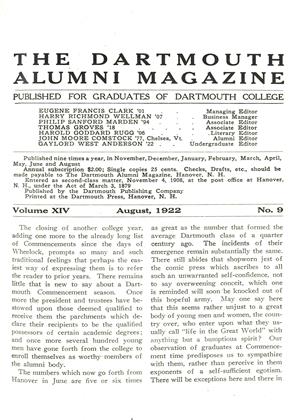The significance .of the work of the late William T. Abbott '90 as assistant director of the budget is plainly indicated in an editorial from The Commercial and, Financial Chronicle of New York for June 3, 1922. An account of Mr. Abbott's life is found in a later section of this issue. The following is from the editorial:
It was at the invitation of the President that Mr. Abbott came to Washington last July to assist General Dawes in the organization of the Bureau of the Budget. The President considered the occasion one of national emergency. The question of financial organization was urgent and of stupendous magnitude. Mr. Abbott responded to the call of the President in that same high spirit of devotion to his country that carried us through the Great War. He accepted the office of Assistant Director of the Budget, although its legal status and the compensation attached were immeasurably below his great ability. From the first day of July to the first day of January, he devoted every ounce of his energy to organizing and preparing the first' Federal budget. He was at his desk early and late.
During the depressing mid-summer heat of Washington, when men of younger years sought the cool breezes of seashore or mountain side, Mr. Abbott devoted his undivided attention to the job in hand. He brought to bear upon an almost inconceivable mass of Government detail his own ripe experience as a business man and financier. The first budget as presented to Congress by the President was, we understand, in so"-far as the form, arrangement and principles underlying its preparation are considered, his work. The value of his services cannot be measured by the short period of his connection with the Bureau of the Budget. As General Dawes said at a farewell dinner to Mr. Abbott, his work will go down in the history of the Treasury, and his services to his President and to his country will not soon be forgotten.
So impressed was the President with Mr. Abbott's work on the budget that he asked him to make a further sacrifice for the public service and to accept an appointment as one of three representatives of the public on the new Federal Tax Simplification Board. This office paid no salary, but carried with it the great responsibility of simplifying the forms and procedure in collecting the Federal taxes. He was engaged on this work when he became ill in the Treasury Building. He died a few days later.
Mr. Abbott shunned publicity. During his recent connection with the Government the newspapers asked in vain for interviews from him. He refused to be photographed. He sought neither advertisement, commendation, praise nor applause. His mind would not be diverted from the work he had set himself to do. In him was embodied the strong virtues of those sturdy New Englanders who have made the Middle West the backbone of the country, and it is upon such men as him that the economic salvation of the world depends today.
 View Full Issue
View Full Issue
More From This Issue
-
 Article
ArticleCOMMENCEMENT 1922
August 1922 By PHILIP S. MARDEN '94 -
 Article
ArticleThe closing of another college
August 1922 -
 Article
ArticleTHIRTY YEARS
August 1922 By PROFESSOR JOHN KING LORD '68 -
 Article
ArticleALUMNI COUNCIL MEETS IN HANOVER
August 1922 -
 Sports
SportsBASEBALL
August 1922 -
 Class Notes
Class NotesCLASS OF 1911
August 1922 By Nathaniel G. Burleigh
Article
-
 Article
ArticleBUILDING OPERATIONS
January, 1912 -
 Article
ArticleDartmouth Services for Dartmouth Menin Service
June 1943 -
 Article
ArticleTreasurers Elect
April 1944 -
 Article
ArticlePrescription Classes
June 1994 By David Sobie '94 and Kai Singer '95 -
 Article
ArticleTuck School
NOVEMBER 1962 By GEORGE DROWNE D'33 -
 Article
ArticleMedical School
JUNE 1963 By HARRY W. SAVAGE M' 27


